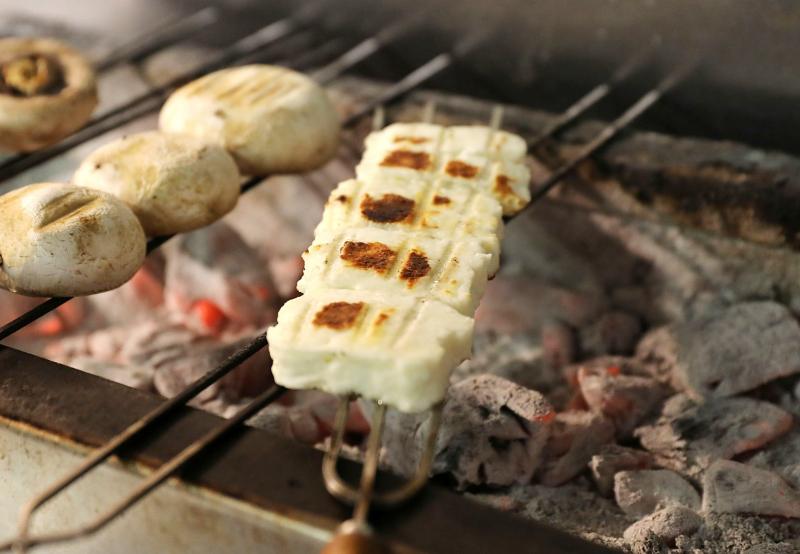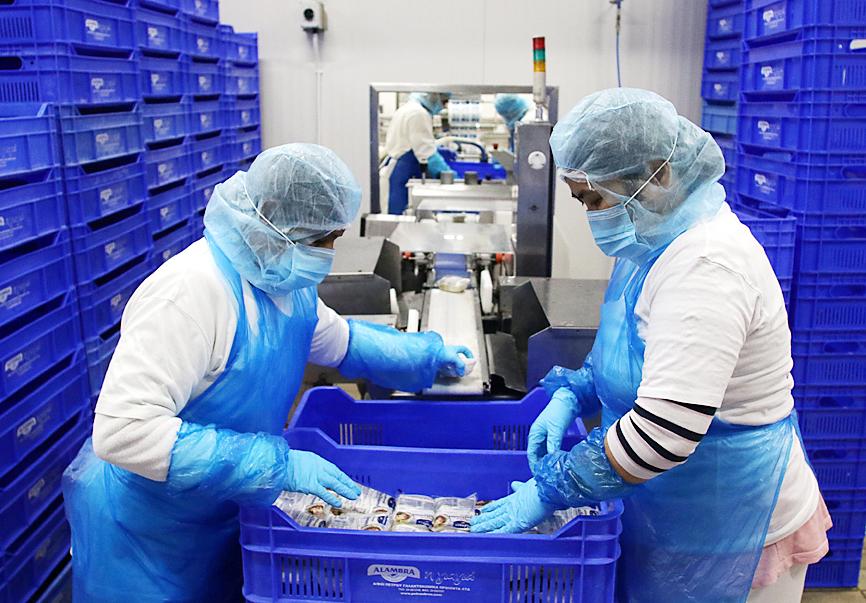Cyprus is getting protected status for its prized halloumi, giving its producers the sole right to sell the rubbery cheese in the EU.
Later this month, the EU is set to formally give halloumi, or hellim in Turkish, the protected designation of origin (PDO) status, which would take effect from October, the Cyprus Department of Agriculture said.
The move reaffirms what the industry and state have said for years, said cheesemaker George Petrou, general manager of Petrou Bros Dairy, which has about 25 percent of Cyprus’ export market: that halloumi is Cypriot, with historical accounts suggesting production as early as about 1500.

Photo: Reuters
“Unfortunately in recent years, many countries tried to copy us, so the registration will help very much, in that other countries will not produce halloumi or something similar that misleads consumers,” he said.
As a child, Petrou learned the secrets of making halloumi from his late mother, Kakkoulou, who sold it at farmers’ markets.
As she gently stirred the milk to separate the curds in a vast hartzin, or cauldron, he would mill around the kitchen, observing her.

Photo: Reuters
In 1982, Petrou started selling halloumi under the Alambra brand to supplement his income as a first-division soccer player, and he has not looked back.
From using 250 liters of milk per day to make halloumi, Petrou’s company, initially set up with an elder brother, now processes 250 tonnes of milk per day, employing 220 people and exporting to 40 countries.
Its expansion mirrors that of Cyprus’ halloumi production.
Now the country’s second-most valuable export after pharmaceuticals, the industry has grown between 20 percent and 22 percent annually in the past five years, official data showed.
The agriculture department said that it has now set its sights on expanding into China.
There were hurdles to overcome in securing the prized PDO status, including disagreements on the ratios of goat, sheep and cows’ milk in the recipe.
Until 2024, the ratios are to be set by decree, and after that at least 50 percent is to be made up of sheep and goats’ milk, with the rest supplemented by cows’ milk.
Although recipes for halloumi abound online, locals prefer to enjoy the versatile cheese is its simplest form — tossed in the frying pan or on a barbecue, eaten raw with melon in the summer, or cubed and thrown in to boil with trahana, a cracked wheat and yoghurt soup eaten in winter.
“A lot of tourists come here looking for it,” said Evroulla Ioannou, who serves up grilled halloumi at her restaurant in Nicosia, Cyprus’ capital.
“Some only know it by name, so they come to try it — and from what I see, they really like it,” she said.

‘IN A DIFFERENT PLACE’: The envoy first visited Shanghai, where he attended a Chinese basketball playoff match, and is to meet top officials in Beijing tomorrow US Secretary of State Antony Blinken yesterday arrived in China on his second visit in a year as the US ramps up pressure on its rival over its support for Russia while also seeking to manage tensions with Beijing. The US diplomat tomorrow is to meet China’s top brass in Beijing, where he is also expected to plead for restraint as Taiwan inaugurates president-elect William Lai (賴清德), and to raise US concerns on Chinese trade practices. However, Blinken is also seeking to stabilize ties, with tensions between the world’s two largest economies easing since his previous visit in June last year. At the
Nearly half of China’s major cities are suffering “moderate to severe” levels of subsidence, putting millions of people at risk of flooding, especially as sea levels rise, according to a study of nationwide satellite data released yesterday. The authors of the paper, published by the journal Science, found that 45 percent of China’s urban land was sinking faster than 3mm per year, with 16 percent at more than 10mm per year, driven not only by declining water tables, but also the sheer weight of the built environment. With China’s urban population already in excess of 900 million people, “even a small portion

UNSETTLING IMAGES: The scene took place in front of TV crews covering the Trump trial, with a CNN anchor calling it an ‘emotional and unbelievably disturbing moment’ A man who doused himself in an accelerant and set himself on fire outside the courthouse where former US president Donald Trump is on trial has died, police said yesterday. The New York City Police Department (NYPD) said the man was declared dead by staff at an area hospital. The man was in Collect Pond Park at about 1:30pm on Friday when he took out pamphlets espousing conspiracy theories, tossed them around, then doused himself in an accelerant and set himself on fire, officials and witnesses said. A large number of police officers were nearby when it happened. Some officers and bystanders rushed

Beijing is continuing to commit genocide and crimes against humanity against Uyghurs and other Muslim minorities in its western Xinjiang province, U.S. Secretary of State Antony Blinken said in a report published on Monday, ahead of his planned visit to China this week. The State Department’s annual human rights report, which documents abuses recorded all over the world during the previous calendar year, repeated language from previous years on the treatment of Muslims in Xinjiang, but the publication raises the issue ahead of delicate talks, including on the war in Ukraine and global trade, between the top U.S. diplomat and Chinese